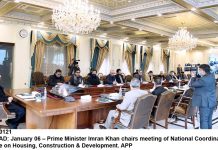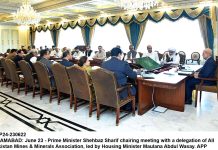Afghan D
elegation of Trad
e and Commerce member, Noor Agha Ebrahimee, on Tuesday, remarked that lingual, cultural, geographical proximities demanded Pakistani and Afghan businessmen and civil society to join hands.
A part of an eight-member group visiting Pakistan for different economic engagements, he said this at a round-table discussion on “P
ak-Afghan Bilateral Trad
e and Future Developments,” organised by Center for Research and Security Studies (CRSS), Islamabad.
Ebrahimee urged officials from both sides to facilitate economic activity across the border.
“Let’s get start working together to carve out a be
tter future for the coming generation,” he added.
Politics and economics cannot go hand in hand, he asserted, while claiming that traders and businessmen are not and must not be political at all.
Quoting a saying in Pashto, “Love increases with visits and counter-visits, so sometimes you visit and sometimes I will visit you, my beloved,” Ebraheemi stated the P
ak-Afghan relationship was multidimensional.
It was not just the relationship of two neighbours, but one of a common history, culture, language, interests, and many other commonalities, he maintained.
‘Politics and economics cannot go hand in hand,’ warns Afghan d
elegate
The Afghan d
elegation also discussed the problems of customs valuation; bonded carriers; regulatory duty; high transit fee; quarantin
e and visa issues faced amid engagement with Pakistan.
Some argued that this negatively impacted Pakistan’s trade figures as well since Afghan traders were forced to look for other options where they were greatly facilitated. Whereas both countries know that Afghanistan and Pakistan are the best markets for each other in every aspect, it noted.
Earlier, the d
elegation had met with officials from Pakistan Ministry of Foreign Affairs (MoFA).
According to the Afghan d
elegation, Pakistani officials stated the ministry was vigorously working to resolve the impediments from their side.
They also asked the Afghan d
elegation to propose some solid recommendations in this regard.
Islamabad Women Chamber of Commerc
e and Industry(IWCCI) President, Rizwana Asif, expressed pleasure when heard about a si
milar organisation in Afghanistan. She offered to host Afghan businesswomen and traders. To which, the visiting Afghan d
elegation nodded positively and enthusiastically while proposing an expansion of this process in a bid to convene si
milar trade-related meetings.
Likewise, Kabul’s Bright Business Complex Managing Director, Khalid Stanikzai, also welcomed Pakistani investors in Afghanistan to set up factories or industries, both on the basis of sole proprietorship and/or in partnership with Afghan businessmen.
He assured that Afghan trade groups and networks would take great car
e and assist Pakistanis regarding legal issues on the Afghan soil.
Rawalpindi Women Chambers and Commerc
e and Industry’s representative, Irum Mumtaz, stated that firstly, there was a need for greater networking, information-sharing, and bridging the supply and demand side of the trade.
Afterwards, these networks could be consolidated across the border to build trust and improve bilateral trade relations.
In conclusion, Afghan d
elegation thanked CRSS for its concerted efforts and organising such roundtables regularly, where Afghan and Pakistani traders sit across each other. The platform allowed them to discuss issues, come up with recommendations and propose these to their respective governments.
The outcome may not be excellent. However, incremental change was said to be paving the way for a progressive future; one step at a time.













